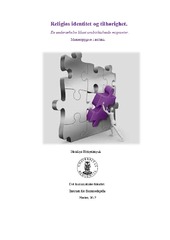| dc.description.abstract | This work is a qualitative study on the relationship between the religion of Islam and integration. I try to investigate the way Islam can be an obstacle or an advantage to the integration of practicing Muslims in the Norwegian society. I do this by looking at their religious identity and the way it is influenced by the Norwegian society and its context. Islam is a complicated phenomenon that embraces all the aspects of Muslims’ life. However, the degree of belonging to Islam varies among practicing Muslims. This demonstrates an increased personification and individualization of Islam, and opens the possibility of interpreting Islam independently and adjusting it to the Norwegian context. The conflict between the basic values of Norwegian society and Islamic values is being problematized as well. In this context, the focus lays on gender equality, where I try to find out if Islam allows this value to be implemented into the daily life of practicing Muslims. I view the meeting between Muslims and ethnic Norwegians as an intercultural communication and try to understand the ways this meeting can be successful. Summarizing my findings, I can say that Islam does not need to be an obstacle for integration. Islam allows reinterpretation of the traditional interpretations of its teachings, and can be adjusted to the Norwegian context. Thus, it cannot be looked upon from a general perspective because there is a wide variety of interpretations and individual approaches toward this religion. It is necessary for both Muslims and the Norwegian majority to cooperate. In this way, the integration as a political aim of incorporation of Muslim minorities can succeed. Alienation, when the ethnic Norwegian majority population does not accept Muslims as equal members of the Norwegian society, seems inhibitory to the integration. Simultaneously, it influences Muslim minorities’ feelings of belonging to Norwegian society. Generalizations and stigmatizations of Muslims affect the communication between Muslims and ethnic Norwegians in a negative direction, and prevents integration of this multifarious group into the Norwegian society. | en_US |
